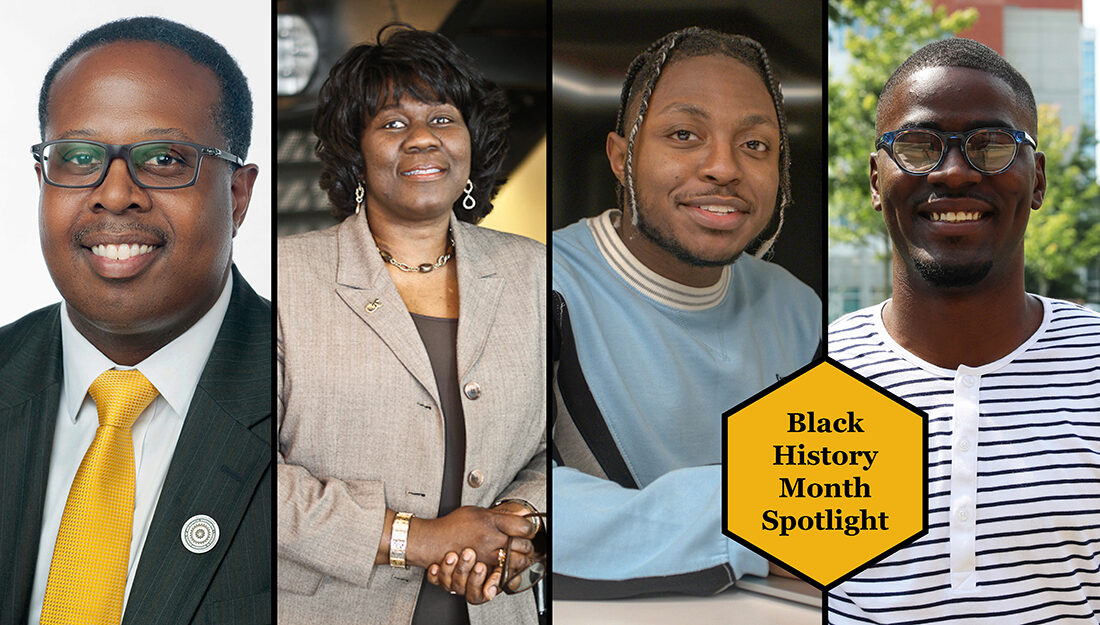
Black History Month Spotlight
February 24, 2021 | Interviews by Candler Hobbs and Ben Wright
In recognition of Black History Month, we sat down with four members of the Woodruff School to talk about their experiences both personally and professionally. They share their thoughts on their role models, experiences that have shaped them, and how we can continue to better champion the importance of diversity at Georgia Tech and in our personal lives. Dr. Samuel Graham is the Eugene C. Gwaltney, Jr. School Chair and professor for the Woodruff School, Melody Foster is a unit administrative officer, Mack Curtis is an academic assistant in the Office of Student Services, and Rahmel Bailey is a fourth year student from Brooklyn, New York.
Can you tell us about an early experience that influenced you personally or professionally?
Graham: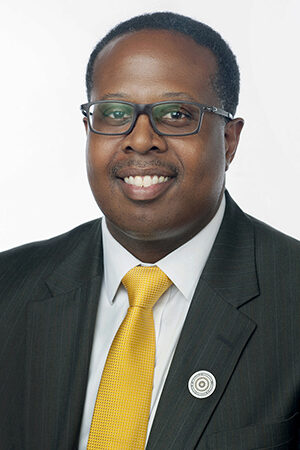 My parents didn’t go to college, so I am a first-generation college student. My parents grew up in South Carolina, and their way out of the rural south was my dad joining the military. As we grew up moving around the world as a military family, my parents instilled in us hard work and a lot of core values that stick with me today. So, a lot of the things that you see me do and how I behave are a result of what I learned from my parents. And I think that has served me well — the discipline that I have in terms of how to approach things.
My parents didn’t go to college, so I am a first-generation college student. My parents grew up in South Carolina, and their way out of the rural south was my dad joining the military. As we grew up moving around the world as a military family, my parents instilled in us hard work and a lot of core values that stick with me today. So, a lot of the things that you see me do and how I behave are a result of what I learned from my parents. And I think that has served me well — the discipline that I have in terms of how to approach things.
My parents gave me opportunities that they didn’t have growing up in the rural south. There were things that my siblings and I had to do growing up that probably most other kids had to do in terms of work around the house, but I had the time to focus on school in a way that my parents probably didn’t have growing up on a farm. And with my dad serving in the military, I got a chance to see a lot of high-tech equipment, which sparked this curiosity for mechanical things. In high school, I attended a summer camp at the University of South Carolina, and two summer camps at Clemson University that introduced me to this thing called ‘engineering.’ I didn’t even really know what engineering was, but I did know that they covered some topics that I was curious about, and it was a way to visit a college campus for a couple of weeks while in high school. By the time I did the second summer camp at Clemson, I knew engineering was what I wanted to do, and I knew that it was going to be mechanical engineering. I have four siblings, and luckily, all of us were able to go to college and do quite well. All of us were instilled with the same work ethic by my parents, even though they did not go to college.
Once I got into college, I continued to do internships — partially because my parents didn’t have a lot of money to send me to school, so I had to make money, and internships are a great way to do it. I did two internships at Pratt and Whitney, and then went to a few other companies, and I just really began to understand what was going on in various sectors of engineering. I also worked in a research lab as an undergrad because it was fun doing a lot of experimental testing and learning more about ME. I think those were early influences for really grounding me.
Foster:
When I was in high school, I wanted to be a teacher. But my counselor was like, ‘No, you’re more business oriented. You should go into the field of business or accounting or something like that.’ So, I listened to what he had to say and enrolled into college as a business major. While in college, I worked at a company where they allowed me to restructure the office. My office manager was awesome. She told me that I had a knack for organizing and getting people to do what I needed them to do. She allowed me to use the skills I was learning in school. We also streamlined how tasks were handled. She helped me understand that I’m good at leading people. She also helped me to understand that accounting really wasn’t for me, and that I needed to find out what I wanted to do. So, I kind of fell into my field that way.
Curtis:
One early experience that influenced me personally was in my first week of undergrad. I packed my life up in a box and took a long 24-hour Greyhound bus ride from Chicago to Petersburg, Virginia. When I arrived to campus, it was so beautiful. I could smell the opportunity in the air! That feeling was short lived. As a first-generation college student, I found out the hard way the importance of making sure you have your financial aid package straight with the financial aid department. I was a bit short on a few fees and I was hard pressed for cash.
Day two and three on campus, I found myself going from office to office trying to find solutions to my issue. Day four is when this experience influenced me personally. After another long unsuccessful day trying to fulfill the rest of my tuition payment, I was greeted with a letter on my room door. It was bright yellow. I like yellow, but this letter was devastating to my eye. The letter basically told me that I had one day to fulfill my payment or I would find my things (my life in that one box!) out front, and that I would have to turn over my room keys. I cried that night on my twin bed that had no sheets. I recall thinking to myself, “Did I give my all in four years of high school just to experience four days of college?” It was that question to myself that lit a fire inside me. I couldn’t fathom going back home to the streets of Chicago. I knew I was in the right place at the right time.
The day after receiving the letter, I went to the financial aid department and sold myself like never before. I guaranteed that I would graduate on time if they gave me a shot. They heard me out and rewarded me with a scholarship, and work study position. I rewarded their kind risk by graduating on time with honors. I learned to never give up. Even if defeat seems eminent, never give up!
Bailey:
I’m from Brooklyn, New York and I was accepted into one of the top high schools in New York City. There was a lack of diversity there which was a culture shift coming from my previous school that was predominately of color.
When I was a freshman Black History Month started and nobody said anything or did anything. It wasn’t mentioned. There was no recognition at all. I went to one of the few Black teachers and said, “We need to do something about this.”
We ended up starting a Black Student Union, with the purpose of serving as a space for Black students to celebrate their culture and put on events.
So starting that organization was big for me. It was the first times that I had to step up professionally, run an organization and be a leader. That led to me getting involved in other forms of student government at my school and throughout the city.
I was on one council with about 30 students and we helped create initiatives for 1.1 million students in New York City. I ended up being elected the president of my school. A short documentary was made about me and my teacher starting the Black Student Union and the impact that we had.
At Tech I’ve been involved in NSBE, AASU, but most recently I’ve gotten into something else. I was the marketing director for Startup Exchange for a while early in my time at Tech. I’m passionate about entrepreneurship and once again I saw a need for Black students to come together. We started an organization called The Black Market to support Black students interested in entrepreneurship. The other founders are India Godfrey, Princeton Henry, Corey Beasley, and Kiandra Peart, who is also a mechanical engineering major.
So far we have collaborated with Create-X to expose students to their programs and have invited entrepreneur guest speaks like Vernell Woods, a GT alumna and founder of Moolah Mobile. We have a lot more in store to get students of color involved in the entrepreneurship community on campus.
Is there someone you view as a major role model in your life?
Graham:
Dr. Namas Chandra, the faculty member I worked for at FAMU-FSU in undergrad would definitely be one of my role models. And then when I got to Tech for graduate school, my advisor, David McDowell was phenomenal in terms of believing in me, teaching me, and giving me guidance to grow professionally. In terms of being African American, coming to grad school where there weren’t many people like me, I would say Gary May had a tremendous influence on me. Learning from Dr. May was inspiring and made me want to emulate the way he did things with excellence. As a faculty member, Seth Marder and Bernard Kippelen were excellent early role models that helped me to expand my research into new areas. At various stages along my journey, these people made me believe that as a young African American, being an engineer and a faculty member was something that I could do and be successful.
I would also say that peer-to-peer mentoring was just as significant for me during my graduate studies at Tech. Calvin Mackie, Johnny Green, Stacey Dixon, and Angela Birkes all were influential during my time at Georgia Tech. Their successes would influence me, and I would turn around and influence them. I think these cohorts of fellow students that you develop are so important, because the faculty can’t always be there for every step that you take.
Foster:
My parents were my first and strongest role models. They taught me everything I know. They taught me the importance of keeping my word, being faithful to who I am, no matter what comes at me in life, and remembering who I am. My parents were not able to go to college. But they made it their business that my siblings and I, graduate from high school and attend college or trade school in whatever field we wanted to do. They’ve always encouraged us and continue to this day (my father passed away, but my mom is still here).
I’ve also had three people that have served as professional role models for me at Georgia Tech. The first one is Melinda Wilson. She used to be over our admin team in the Woodruff School. Melinda had worked at Georgia Tech for about 20 years at the time and retired with 36 years of service. She took me in from the day I started working as a front desk person, and she trained me to do things the Georgia Tech way. She showed me how things were done. If I had questions, she would answer them. And she was my biggest supporter. She’s retired now, but we still keep in touch and she continues to support me.
My second one is Ward Winer. He was my former supervisor as ME school chair. He was the one who told me that I no longer was going to work at the front desk, that I needed to move out of that comfort zone and move into something that was challenging and would make me more active in the school. He didn’t take no for an answer. I laugh about this now because I said ‘no’ several times. He said, ‘Go apply for the job!’ He mentored me and pushed me to be better. Although he’s been retired for 14 years now, we still keep in touch, and he still checks on me to make sure that everything is going well.
And my final role model is LaJauna Ellis. She has encouraged me to pursue job opportunities and to grow in my position. And even now, if I need anything such as advice or encouragement, I can always call her. She’s always been there. I think it’s important that you have people like that around you when you’re working. Because you need that, from time to time…no questions, they’re just there to encourage you and support you.
Curtis:
My big sister for sure! She set the bar very high. Her thoughtful intelligence is admirable. I witnessed her become the first homeowner of the family in generations. It still amazes me. Thanks to her things were less difficulty for me, because I only had to follow her example. I love how humble she is. Always calm, well intended, and immensely determined. She is the one transcendent figure in my life whom I’m forever grateful to learn from, and thrive with.
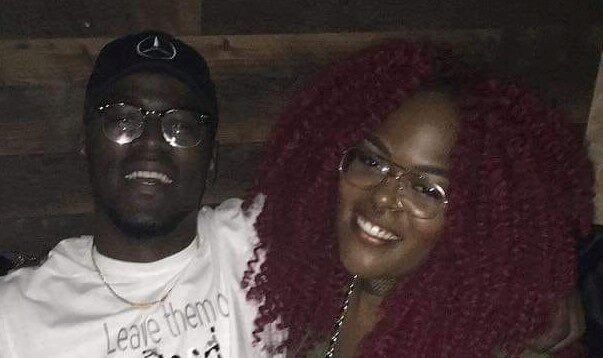
Bailey:
I view my dad as a role model of my life because he understands the importance of education and he understands that education is not just the formal entity where you have an instructor and you get a grade. Education is your ability to find and collect knowledge and thoroughly understand the topic. My dad has had a successful career and he didn't go to college, but he knows a lot about the specific space he is in- he knows more about it than most. He got there by studying on his own, so I’ve learned the importance of that. He has shown me that I don’t have to depend on others to teach me. I can learn from as many different sources as I want and build my own collection of knowledge. He has been my greatest inspiration.
What types of personal and professional obstacles have you faced and how have you overcome them?
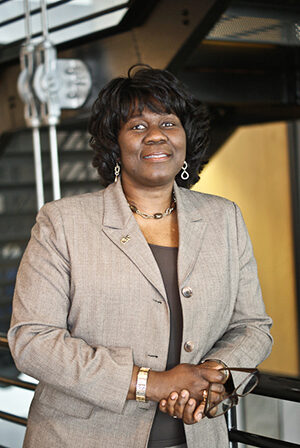 Foster:
Foster:
I don’t dwell on other people’s negativity. So, a lot of times when people aim their racism at me, I subtly correct them, or I ignore them.
But there have been a few times that I’ve been treated differently because of my skin color. For example, while attending Georgia State University in 1986, I took a job there; I was going to school part-time and working full-time. I received a call one day from the VP of finance, asking for a particular report. And I said, ‘Okay, I’ll prepare it, and I’ll bring it up.’ When I walked in his office, he said, ‘You’re not the person I just spoke to.’ And I said, ‘Yes, I am.’ And he said, ‘I asked her to bring me this report.’ And I said, ‘You did speak to me.’ So I gave him the report, and I went back downstairs. Later that day, I overheard him in my supervisor’s office, and he said, someone was playing tricks on him. He said, ‘I talked to a white girl, not a black one. And when I ask people to do something, I expect them to do it.’ When he came back out of the office, I politely said, in a professional tone, ‘Please tell me exactly what a black woman sounds like, should I be talking like this or something,’ and I changed the tone of my voice. He couldn’t respond. He just walked away. My supervisor was livid with him. But I was like, you’ve got to be kidding me! In this day and age, are you really telling me that he expects me to behave a certain way because of the color of my skin? So that pushed me to remember that no matter who I’m with, and what I do, I have to always be professional, because more is expected of me than my counterpart who may have the same experiences and the same lifestyle. Because of the color of my skin, I have to be on top of my game, and I have to stay there. There’s no room for failure sometimes and no room for forgiveness.
Personally, I think there’s a lot of work that we need to do in America, and I don’t know how to change it. I wish I had an answer. But I know that if we start to look at each other as people and not as ethnicities, like black or white, we’ll get along a whole lot better.
Graham:
It ties back to growing up in a family where we were first-generation college students. We were all doing well, but we could have easily fallen into a trap of not making it. As a first-generation college student, you may have great talent, but the fact that you don’t have the money, and you don’t have someone there to guide you on how to go to college, how to make certain decisions, and how to get through it makes it that much more difficult. I am thankful that I had good mentors, and that’s why I have a desire to always reach back and help talented first-generation college students.
I’d say the biggest hurdle was not knowing the opportunities, not knowing what was really out there, and not knowing what you could really become. It’s hard to believe in something that you haven’t envisioned. So, at some point, you have to believe in people’s encouragement of you to keep pushing, and you have to seek out the truth, and find out what’s really inside of you. And eventually you grab ahold of that dream and you run with it.
Curtis:
On a personal level, placing too much stake in things out of my control. I’m a huge Bears fan, and for those who don’t know, we kind of stink at the quarterback position and we have a horrific front office. After years of frustration, I had to realize that I’m not a player or a coach. I’m just a fan that needed to focus on things that I can control. I haven’t stressed about my Bears since taking that approach.
Professionally, learning new systems is a challenge. At Georgia Tech we are always looking to improve how efficient we are so when new systems are rolled out, you need to learn them inside and out. I simply take time out to learn them and understand the functionalities of the system. Tech does a terrific job with recorded training webinars, so you learn at your own pace. I like to get proficient with a new system so my colleagues can come to me for help if they run into any issues or problems.
Bailey:
One of the most challenging times for me was here at Georgia Tech my first year. I came here under unusual circumstances. The summer before I started, I had a serious concussion. I was going to the doctor on a regular basis for a long time and was under strict instructions from my doctor about what I could do.
Because of my condition, I worked with the Office of Disability Services. It was hard to start here at less than my fullest ability. I didn’t have a lot of energy. I had to take a lot of breaks, and I needed extra time for exams. My ability to understand and process things was off. So I had to put even more time and effort into my work, but at the same time try to get healthy and not overextend myself. I took advantage of the resources that were available and I appreciate my professors working with me during all of that. I was still able to make some great friends and my parents were very supportive. Otherwise, I couldn’t have done it. It was tough.
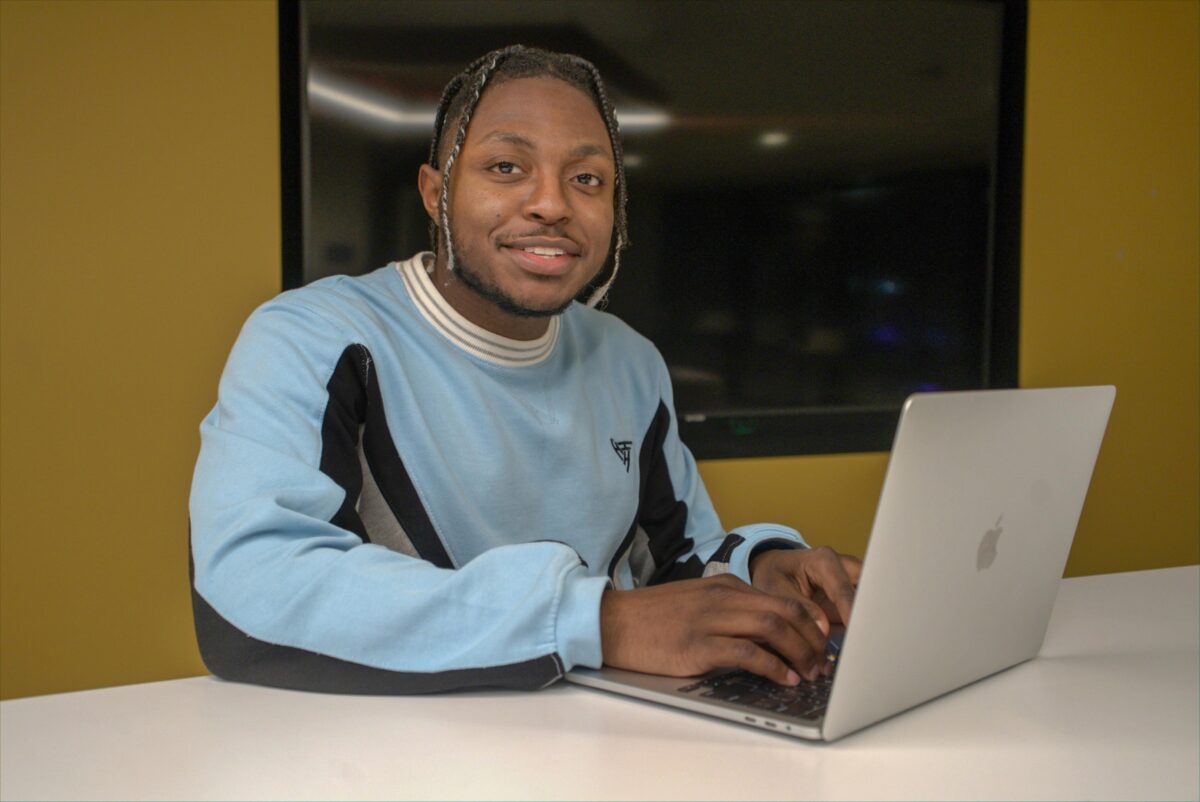
What are your thoughts on how we can continue to better champion the importance of diversity at Georgia Tech and in our personal lives?
Foster:
I think Georgia Tech from top to bottom need to continue to communicate the importance of managing bias through seminars, classes, training programs, etc. Not everyone is going to attend it but if you put it out there and enough people start to change, they’ll bring people with them. I feel you must lead by example. Titles matter as far as how you get promoted, but they shouldn’t matter on how we treat people. I don’t know that it can be done across the board, but Georgia Tech needs to train people, and then generally promote diversity when hiring in the higher-level positions. I’m not saying hire just because of the color of their skin, but hire because of the quality of work and skills that person brings to that position, and what they’ve shown that they can do.
Diversity can’t just be at work, your personal life has to reflect that in order for it to be meaningful. If we only practice diversity at work and we don’t do it at home, I don’t think the full transformation is going to happen.
Diversity is about reading and learning about other people. Learning different cultures, learning what makes people who they are. If you want to know something, read, study, and then ask questions. I think if you learn about things and you’re educated about something, then you can do something about it. So, if I could say anything to encourage diversity, it would be: educate yourself, and then be active in making a change.
Graham:
We have to continue building the community to improve diversity — championing how to bring more people into a great place like Georgia Tech, expanding access for a broader pool. In addition to bringing more people in, you need the right environment once they get here. Otherwise, they won’t grow and reach their potential. So, I think we have to do a great job in terms of attracting the talent, but we also have to continue working on the environment that students, staff, and faculty have to operate in. That is probably the biggest thing we can do. And if we don’t do that, we’re going to continue to have the problems that we see in terms of the underlying climate and divisions working against our goals of making this truly a place that champions diversity, equity, and inclusion.
At Georgia Tech, we talk about improving the human condition. And the question I have is, ‘How are you going to impact society, if you don’t understand society? How are you going to improve the human condition if you don’t understand the human condition?’ By bringing diverse groups of people in, you’re bringing in bits and pieces of those stories and an understanding of the challenges faced in society. And that is what gets you to the point of better understanding the human condition, and better understanding the problems in society. You have to do it through diversity. It is truly about bringing in the right voices, so we can come up with the best solutions.
Curtis:
Diversity is very important and I think Tech is on the right track to continue to build its diverse coalition. With a more diverse climate, it will potentially break down barriers created out of inaction and lack of effort to understand each other. With a strong diverse coalition, more people may feel like their voices are not just heard, but also taken seriously. We should always reach out to understand the beliefs, culture, and traditions of others. We all consider ourselves to be good people, but do we assume the same of others? Do we give them the benefit of the doubt? I always think about this question and I would implore others to do the same.
Bailey:
I think the biggest thing we have to do is make students feel more comfortable and welcome within the Georgia Tech community. This is their space, and all students deserve to feel like they belong here. Unfortunately, I don't think that's the case for every student. In my experience, and from talking to others, there are times when black students and students of color feel like outsiders. We haven’t all had the same opportunities or come from the same backgrounds. Nobody should feel bad for not coming in with AP credits if their school didn’t offer those classes. People just need to recognize that not everyone had the same opportunities before Georgia Tech.
In terms of what can be done, organizations need to let people know others are welcome. Reach out to people and show them that opportunities exist for everyone. Some students might want to be involved but they look at an organization and see how it’s made up and aren’t sure they’re welcome. They need to feel like people want them to be a part of it and then from there people can build relationships that they didn't have before.
Groups like CEED and OMED are a big help. Knowing there’s a community there to support us, and seeing Black staff and faculty with resources to help us- that’s encouraging. They do a good job, but I want to feel that in more organizations and throughout the campus too.
